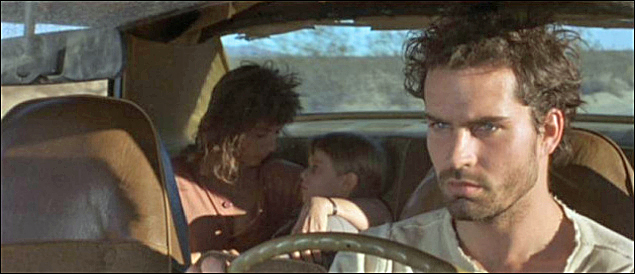The FAR tires of being cooped up in the backseat. We don’t want another sing-along to songs about neo-noirs, Cannes premieres, dark comedic performances, kindly directors. Pull over. We’re car sick.
Thanks to absolutely nobody for contributing this week, you savages. Redeem yourselves by sending articles throughout the next week to ploughmanplods [at] gmail, post articles from the past week below for discussion, and Have a Happy Friday!
At The Ringer, Brian Raftery starts a series on the neo-noir movement of the 90s, including obsessions of the Solute all the way to directors merely noted by the Solute like John Dahl, Carl Franklin and James Foley:
That middle-of-nowhereness gives After Dark, My Sweet an almost alien feel. Yet even though it traffics in so many noir tropes—the shifty ex-boxer, the menacing but podunk crime boss—Foley never thought of the film as a film noir until others started describing it as one. He was simply making a film about desperate, amoral characters who don’t yet realize how doomed they are—what he calls his “sweet spot.” “I had no idea it was noir until I read the reviews,” he says. “But I’m happy to have gotten away with it.”
The Cannes Film Festival opened with Leos Carax’s ambitious rock opera Annette starring Adam Driver and Madeline Cotillard. reviews the film for The Observer:
What happens when you take Leos Carax’s poetic style and emotionally raw storytelling and mix it with Spark’s multi-layered and kind of esoteric pop songwriting? Annette, of course. Whether you are already familiar with both or you just got to know about Sparks thanks to Edgar Wright’s The Sparks Brothers documentary, Annette is everything you’d imagine from a collaboration between Sparks and Carax, for better and worse. This is a film that is as overindulgent as it is earnest, but flaws and all, it is worth the wait. It becomes clear Annette will be a divisive film from the moment Carax opens it via voice-over narration to instruct audiences to hold their breath for the entire runtime, before we see him, his daughter, Sparks, and the entire main cast walk out of a recording studio and into the streets of Los Angeles while singing a song about starting the show.
Speaking of the festival, for Vulture, Rachel Handler talks to a taciturn Val Kilmer to cap a summary of his highly unusual and highly personal doc making its debut at Cannes:
Val, which premieres at Cannes Film Festival on Wednesday, is a genuinely surprising and strange movie that vacillates between emotional extremes at an almost minute-by-minute pace. We see grainy, kooky footage of Val and Wesley as a slaphappy kid before learning (via Kilmer’s son Jack’s voice-over) that the actor’s brother drowned in their family’s hot tub after an epileptic fit. We hear Kilmer briefly addressing persistent rumors that he was “difficult” or “hard to work with” on various film sets while watching footage of him on those same sets. (A highlight: his attempt to shoot the shit with a forlorn-looking Marlon Brando — his lifelong hero — on the set of the famously doomed Island of Dr. Moreau.) We see him finding his way at Juilliard as a raw-talent 17-year-old and realizing, in an early Off Broadway play where he’s pushed down the call sheet, that he’s desperate to be taken seriously. Cue parts in the less-than-serious Top Gun and the spy spoof Top Secret! and eventually Batman, which required a suit that prohibited him from emoting — or even breathing, really — the way he needed to.
Our favorite nerd Douglas Laman takes to Collider to argue that Jason Sudekis’s best performance is his darkest one, from 2017’s Colossal:
Much like how Paul Thomas Anderson grounded Adam Sandler’s man-children protagonists in uncomfortable reality in Punch-Drunk Love, so too is Vigalondo emphasizing inherent creepy qualities to traditional Sudeikis characters like his protagonist from Hall Pass. Just because someone says things in a chill demeanor with confidence doesn’t mean they’re harmless. However, it can be easy to overlook these subtle bits of subversion in Oscar as Gloria navigates indecisiveness over her direction in life. Her sense of aimlessness leads her to a discovery that sets the high-concept part of Colossal’s story into motion.
Tributes to the late Richard Donner came in this week. Jeff Cohen aka Chunk from The Goonies remembers when the director paid his way through college:
There’s a quote from Ben Franklin: “It is the height of cleverness to conceal it.” That is Dick Donner. He was the smartest guy in every room, but he never made anyone feel less than him. He always made everyone feel great. He made you feel smart and important. He never needed to show off. He never needed to step into the limelight. He wanted everyone else to look good. He wanted everyone else to succeed.

